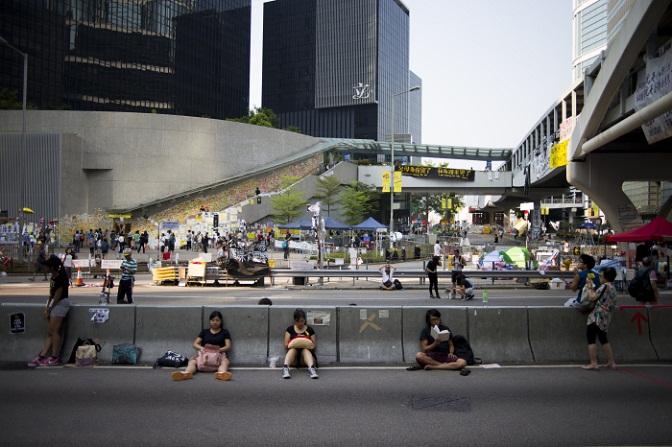ENGLISH
Hong Kong Students and Pro-democracy Activists Refuse to go Home
"They have committed to staying until political reforms are secured."
Adam McCauley

In late September, students and pro-democracy supporters took to the streets of Hong Kong. After weathering tear gas and pepper spray, and the violent attacks from opposition groups, the crowds that once numbered 100,000 strong, have dwindled.
As you walk through Hong Kong’s Central district, passed barricades adorned with countless yellow ribbons, you can still hear the voices of the Umbrella Movement. This four-lane highway has been closed for 10 days, and now serves as town square for the largest civil disobedience movement Hong Kong, or China, has seen in recent memory.
But the calm of today stands in sharp relief to events of late September, as police —unable to clear public roads— resorted to the use of tear gas, peppers spray to push back the demonstrators.
For university student, Harry Chan, however, the protests signaled a change in Hong Kong.
“In the old time, people just go to the protests and … police would just clear the way and they would leave. But this time its different, people are not willing to concede about anything.”
Chan is a supporter of the Hong Kong Federation of Students, who, together with the high school activist group Scholarism and Occupy Central, have demanded Beijing reverse its August decision on preselecting candidates for Hong Kong’s Chief executive elections in 2017. But as the protests matured, the groups’ demands grew, leading to calls for Hong Kong’s current Chief Executive, C.Y. Leung to resign.
For 26 year old Jack Ng, the Chief Executive had lost the support of the city.
“I think the main reason is the frustration about what the police did to the students. There was definitely too much force, too much violence.”
Last Thursday, the Hong Kong’s Chief Secretary, announced she would meet with leaders of the Hong Kong Federation of students. But within 24 hours, violence against protestors in the neighborhood of Mong Kok, near luxury shops popular with Mainland Chinese tourists, led student leaders to call off the discussions. They said the government had not protected their rights for peaceful protest.
Today, however, the streets are emptier, as protest signs flutter in gusting winds. The crowd, which once numbered 100,000, has shrunk to around 1,000. Amid countless supply tents, curious residents and tourists to Hong Kong flitter through the car-free highway. They take photographs, listen to impromptu speeches, or leave messages on the rapidly expanding “Lennon Wall” —now covered in brightly colored post-it notes with sharing messages of support.
For these reasons, students like 18-year-old Matthew Mak believe the city has changed.
“I think that this event will be successful… because we all have to hope and heart to create change.”
Every so often, though, protestors are reminded of the powers that lie just beyond the island of Hong Kong. Within earshot of protestors, is the Hong Kong headquarters of China’s People’s Liberation Army. A few times each day, protestors can hear the military on exercise, chanting in unison, even if they are obscured from view.
But even these are passing concerns, that pales in comparison to the dedication of protestors like Chan, who has pledged to see change through, as long as that might take.
“The reason why we’re staying here, is because we want a real democracy and we are willing to sacrifice something in exchange. I think the winner will be the last standing.”
- Hong Kong
- protest
- Umbrella Movement
- Democracy
- Adam McCauley
- eng
Komentar (0)
KBR percaya pembaca situs ini adalah orang-orang yang cerdas dan terpelajar. Karena itu mari kita gunakan kata-kata yang santun di dalam kolom komentar ini. Kalimat yang sopan, menjauhi prasangka SARA (suku, agama, ras dan antargolongan), pasti akan lebih didengar. Yuk, kita praktikkan!